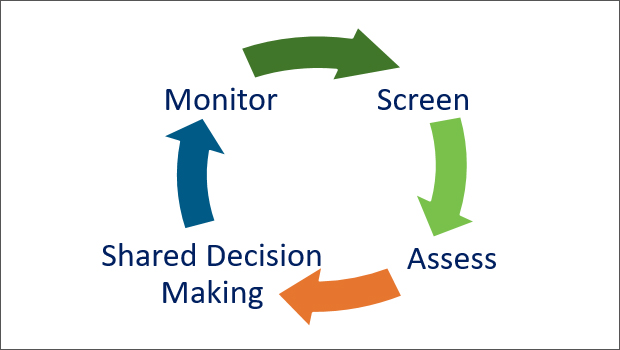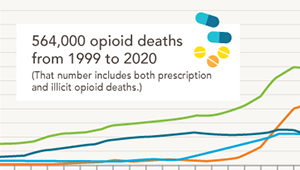Addictions
Research overview
Kaiser Permanente Washington researchers are exploring how to improve prevention and treatment of health issues due to alcohol and other drug use. The addictions research group conducts innovative research to help patients and their providers prevent and treat problems caused by alcohol, cannabis, opioids, and other drugs in health settings.
A major focus of the addictions research group is how to integrate patient-centered care for alcohol and other drug use into medical settings. For more than 3 decades, their work has focused on the need for health systems to routinely measure and address alcohol and other drug use as part of whole-person health, in nonjudgmental, patient-centered ways.
"Our alcohol-related research has built tools — such as a brief video, handout, and a patient decision aid — that help overcome stigma so that patients and families can find the help they want and need," said Katharine A. Bradley, MD, MPH, a senior investigator at Kaiser Permanente Washington Health Research Institute (KPWHRI) and internal medicine physician with Washington Permanente Medical Group.
The addictions research group is conducting a variety of studies to improve measures and documentation of substance use in the medical record. "We are working to find ways to easily document the extent of cannabis exposure for both medical and nonmedical use in electronic health records," said Gwen Lapham, PhD, MSW, a KPWHRI assistant investigator. Finding innovative ways to provide treatment is also a focus. "We are testing how to get proven online treatments for addiction into the hands of patients who could benefit," said Joseph E. Glass, PhD, MSW, a KPWHRI associate investigator whose research at the institute is funded in part by an early-career award to study the effectiveness of treatments for alcohol use disorders in primary care.
These are among the group’s current studies:
- PRimary Care Opioid Use Disorders (PROUD) is an implementation trial testing collaborative care for opioid use disorders.
- Digital Treatments for Substance Use Disorder (DIGITS) is a trial of strategies to implement online substance use disorder treatments into primary care.
- The DIGITS Equity trial is evaluating strategies to improve equity in the use of online treatments for substance use disorders among patients.
- The More Individualized Care: Assessment and Recovery through Engagement (MI-CARE) study is a pragmatic trial testing the effectiveness of a primary care collaborative care program for co-occurring opioid use disorder and depression.
- Dr. Bradley and Associate Biostatistics Investigator Jennifer F. Bobb, PhD — in collaboration with KPWHRI affiliate Kevin Hallgren, PhD, at the University of Washington — are demonstrating the psychometric validity and reliability of a DSM-5 Alcohol Symptom Checklist and Substance Use Symptom Checklist — practical tools for primary care.
- Associate Investigator David S. Carrell, PhD, is leading the Implementing Routine Screening for Cannabis and Other Drug Use Disorders in Primary Care study. Funded by the National Institute on Drug Abuse, this randomized pragmatic trial is evaluating the impact of screening on drug use disorder diagnosis and treatment in 22 Kaiser Permanente Washington clinics.
These are among the studies that the addictions research group has completed:
- The Sustained Patient-centered Alcohol-related Care (SPARC) trial found that implementing integrated mental health in primary care improved sustained implementation of evidence-based alcohol-related care.
- The Medical Cannabis Study explored patterns of medical cannabis use among primary care patients through electronic health record (EHR) and survey data.
- Dr. Lapham partnered with Kaiser Permanente Washington Mental Health and Wellness leaders to design and pilot implementation of evidence-based care for substance use into adolescent primary care.
- In collaboration with Emily Williams, PhD, MPH, a KPWHRI affiliate investigator at Veterans Affairs Puget Sound Health Care System, KPWHRI researchers found that patients with unhealthy alcohol use who had HIV were less likely to receive evidence-based alcohol-related care than those without HIV.
- The Choosing Healthier Drinking Options in Primary Care (CHOICE) trial found that, with nurse care management, collaborative care for patients with high-risk drinking raised their engagement in alcohol-related care — but did not decrease heavy drinking or related problems. However, usual care may have had benefits for patients with high-risk drinking but without symptoms of alcohol use disorders.
- The Options study developed a patient-centered decision aid for thinking about drinking and learning about options for making changes in drinking. This is now provided as a resource by the National Institute on Alcohol Abuse and Alcoholism in its Core Curriculum for medical providers.
Sparc trial tools
Resources for behavioral health integration
The SPARC trial successfully implemented behavioral health care into primary care. On our website, you can access tools for behavioral health integration, as well as frequently asked questions and publications.
Recent Publications on Addictions
Aalsma MC, Aarons GA, Adams ZW, Alton MD, Boustani M, Dir AL, Embi PJ, Grannis S, Hulvershorn LA, Huntsinger D, Lewis CC, Monahan P, Saldana L, Schwartz K, Simon KI, Terry N, Wiehe SE, Zapolski TCB. Alliances to disseminate addiction prevention and treatment (ADAPT): A statewide learning health system to reduce substance use among justice-involved youth in rural communities. J Subst Abuse Treat. 2021 Mar 16:108368. doi: 10.1016/j.jsat.2021.108368 [Epub ahead of print] PubMed
Firemark AJ, Schneider JL, Kuntz JL, Papajorgji-Taylor D, Dickerson JF, Thorsness LA, Reese KR, Sullivan MD, Debar LL, Smith DH. "We need to taper" interviews with clinicians and pharmacists about use of a pharmacy-led opioid tapering program. Pain Med. 2021 May 21;22(5):1213-1222. doi: 10.1093/pm/pnaa442. PubMed
Tsui JI, Akosile MA, Lapham GT, Boudreau DM, Johnson EA, Bobb JF, Binswanger IA, Yarborough BJH, Glass JE, Rossom RC, Murphy MT, Cunningham CO, Arnsten JH, Thakral M, Saxon AJ, Merrill JO, Samet JH, Bart GB, Campbell CI, Loree AM, Silva A, Stotts AL, Ahmedani B, Braciszewski JM, Hechter RC, Northrup TF, Horigian VE, Bradley KA. Prevalence and medication treatment of opioid use disorder among primary care patients with hepatitis C and HIV. J Gen Intern Med. 2021 Feb 10. doi: 10.1007/s11606-020-06389-7. [Epub ahead of print]. PubMed
Gray SL, Elsisi Z, Phelan EA, Hanlon JT. Interventions to reduce fall-risk-increasing drug use to prevent falls: a narrative review of randomized trials. Drugs Aging. 2021 Feb 5. doi: 10.1007/s40266-021-00835-9. [Epub ahead of print]. PubMed
Campbell CI, Saxon AJ, Boudreau DM, Wartko PD, Bobb JF, Lee AK, Matthews AG, McCormack J, Liu DS, Addis M, Altschuler A, Samet JH, LaBelle CT, Arnsten J, Caldeiro RM, Borst DT, Stotts AL, Braciszewski JM, Szapocznik J, Bart G, Schwartz RP, McNeely J, Liebschutz JM, Tsui JI, Merrill JO, Glass JE, Lapham GT, Murphy SM, Weinstein ZM, Yarborough BJH, Bradley KA. PRimary Care Opioid Use Disorders treatment (PROUD) trial protocol: a pragmatic, cluster-randomized implementation trial in primary care for opioid use disorder treatment. Addict Sci Clin Pract. 2021;16(1):9. doi: 10.1186/s13722-021-00218-w. PubMed
Researchers in Addictions
 Jennifer F. Bobb, PhDAssociate Biostatistics Investigator |
 Katharine A. Bradley, MD, MPHSenior Investigator |
 Joseph E. Glass, PhD, MSWAssociate Investigator |
 Clarissa Hsu, PhDAssociate Investigator |
 Gwen Lapham, PhD, MPH, MSWAssistant Investigator |
 Jennifer B. McClure, PhDDirector, Investigative Science |
 Julie E. Richards, PhD, MPHAssistant Investigator |
 Paige D. Wartko, PhD, MPHSenior Collaborative Scientist |
 Yu-Ru Su, PhDAssociate Biostatistics Investigator |
 Leah K. Hamilton, PhDSenior Collaborative Scientist |
 Noorie Hyun, PhDAssociate Biostatistics Investigator |
 Jess Mogk, MPHCollaborative Scientist |
 Morgan Justice, MACollaborative Scientist |
 Theresa E. Matson, PhD, MPHCollaborative Scientist |
Affiliate researcher in addictions
Kevin Hallgren, PhD
Associate Professor
Department of Psychiatry and Behavioral Sciences
University of Washington
Emily Williams, PhD, MPH
Investigator
Health Services Research & Development
VA Puget Sound Health Care System
Edwin Wong, PhD
Associate Professor
Department of Health Services and Population Health
University of Washington














